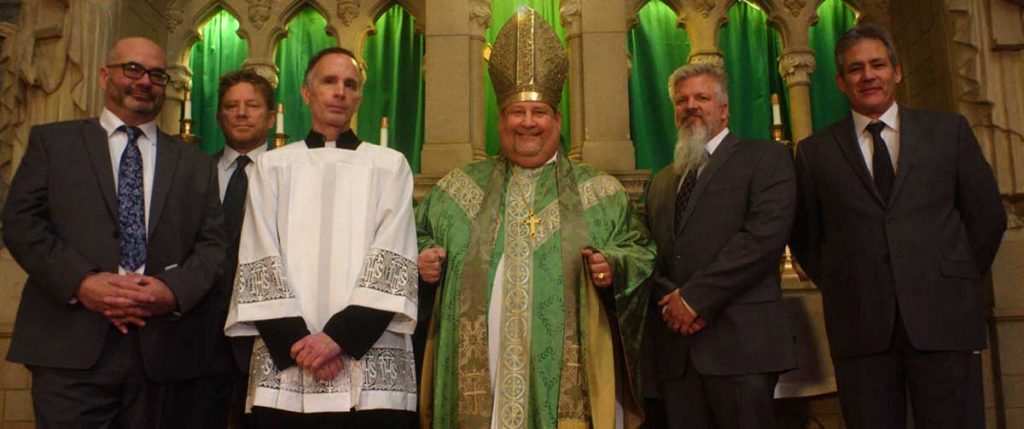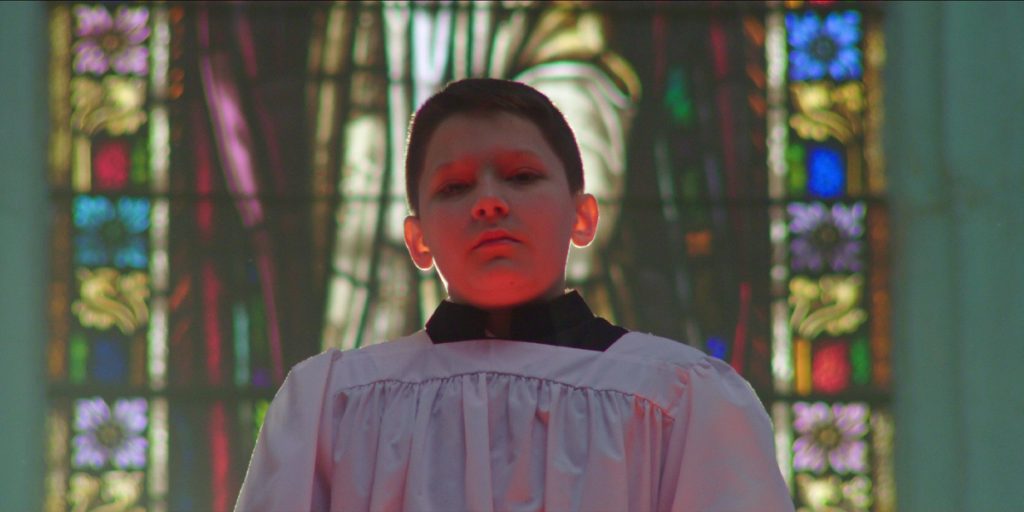Procession sees Robert Greene apply his unorthodox style to a powerful film about the healing power of drama, in the light of the trauma unearthed by the Catholic Church abuse scandal.
When the Catholic Church abuse scandal was first exposed in the early 21st century, the main reaction was one of disbelief. How could the accused priests and the Church have gotten away with this for so long? Decades later, the victims still have to reckon with the abuse they suffered. So does American cinema; Tom McCarthy’s Spotlight told the story of the journalists investigating these historic crimes. However, the recently released Procession from documentary director Robert Greene (Bisbee ’17, Kate Plays Christine) focuses on the victims, giving them the opportunity to tell their stories in an unconventional yet effective manner.
Procession starts with the filmmakers approaching six men to be part of a project. All six men are from the Kansas City area, and all six were sexually abused by Catholic priests. The group meet to discuss using drama therapy, a method of therapy where roleplaying and dramatic scenes are used to help someone come to terms with trauma. Soon, they agree to write a scene based on their experiences. The film chronicles the group as they create their scenarios, work with each other and confront the awful abuse they suffered.
Robert Greene has always had a self-reflexive, unorthodox style. Every documentary he has directed sees him integrate acting and performances, blurring fiction with non-fiction whilst highlighting how both forms of filmmaking require collaboration. Kate Plays Christine combines the shocking story of Christine Chubbuck with actress Katie Lyn Sheil preparing to play her in a fictional film. Bisbee ’17 narrates the Bisbee Deportation through re-enactments performed by the Arizonian town one hundred years later. And with Procession, Greene shows the staged scenarios alongside the process of creating them and the journeys undertaken by his six subjects.
Greene may be documenting this process, but he is not the main filmmaker. As the title card states, Procession is really a film made by the victims – Joe Eldred, Mike Foreman, Ed Gavagan, Dan Laurine, Michael Sandridge and Tom Viviano. Except ‘victim’ isn’t the right word to describe them. They view themselves less as victims and more as survivors trying to conquer their fears and regain control over the events that still haunt them. Dan sums it up best in one scene early on: “it’s an opportunity to take back the power of these places over us. Because we were so young, so tiny and fragile back then.” What the film conveys so brilliantly is the importance of the group creating the scenes that tell their stories. They know what ideas to include, they know these scenes cannot be exploitative or pathetic. This is their film, and Greene rightfully allows them to take centre stage, empowering the survivors to tell their collective story.

As the group start to compose their scenes, some of them visit the places where they were abused as a therapeutic way to retrace their past. In the churches, they are reminded of the religious iconography, the robes and incense burners. The nature of drama therapy means the group are not only acting out their experiences but also confronting them, trying to make sense of what happened. Therefore, in numerous scenes, Procession shows the survivors describing the horrific events they and countless other boys were subjected to. The accounts they give are all stark and sickening, a sobering reminder of how this abuse continued for so long without anyone stopping it.
Equally sickening is the knowledge that justice for these crimes is unlikely. Dan’s abuser is still at large. Michael’s is still a priest. No one is more aware of this lack of justice than Mike. An embittered man tirelessly campaigning to have his day in court, one sequence shows Mike demonstrating his resentment towards the Church and the National Review Board outside a church (which leads to a visit from the police). Another sees him listening to The Who, forcefully rocking back and forth. He is on his own, signifying the isolation he has felt all his life since his traumatic incident. In the end, he gets to voice his anger at both the board and the Catholic Church whilst working with the drama therapist and the group.
It is remarkable to see the collaborative, supportive bond that forms between the six men as they embark on this project. Whilst that is a trait of Robert Greene’s other documentaries, it feels more emotional because they are linked together by an awful trauma. Despite this, the group each have a different take on their abuse, a different story they want to convey. One scenario features a whole congregation of people; another has just two actors. Mike’s dramatic scene ends with him smashing a cake; Joe’s simple scene sees him reading a letter to his younger self. Each scene we see is vividly shot and affective, conveying poignancy and a sense of moving on.
When Joe visits the lakeside home where he was abused for the first time since the incident happened, there is talk of closure and an ending. Whilst the abuse cannot be erased, Procession is a powerful and evocative documentary that shows how trauma can be expressed through the healing power of drama and filmmaking. Thanks to his unorthodox use of acting, Robert Greene delivers an emotionally cathartic experience that excellently allows the survivors to share their stories, conquer their trauma and, as just as Dan says, take back the power.
Procession is now available to watch on Netflix.

